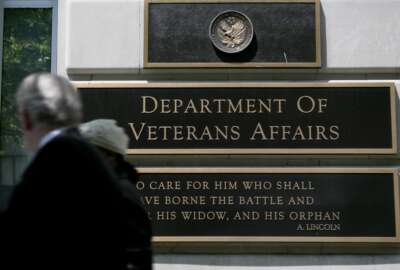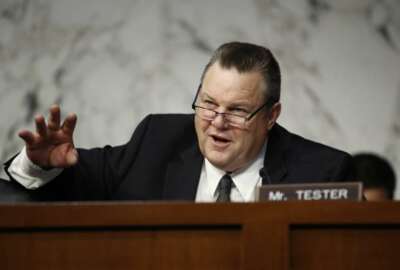
Some MISSION Act care providers report not getting paid by VA
The whole premise of the MISSION Act, to provide veterans with healthcare services that are outside of the system, won't work if providers don't get paid.
Best listening experience is on Chrome, Firefox or Safari. Subscribe to Federal Drive’s daily audio interviews on Apple Podcasts or PodcastOne.
The whole premise of the MISSION Act, to provide veterans with healthcare services that are outside of the system, won’t work if providers don’t get paid. But reports of that very phenomenon keep coming in. And that’s prompted demands for action by the Veterans Health Administration from members of Congress. Among them is the chairman of the House Veterans Affairs Committees Oversight and Investigations subcommittee, New Hampshire Rep. Chris Pappas (D). he joined Federal Drive with Tom Temin for more discussion.
Interview transcript:
Tom Temin: Representative Pappas, good to have you on.
Chris Pappas: Great to be with you, Tom. Thanks for the time.
Tom Temin: Tell us about what you’re seeing and what you’re hearing about who’s getting paid and not getting paid.
Chris Pappas: Well we have seen significant issues with payments for community providers for a number of years, both through the choice program and now, as the MISSION Act has rolled forward, we’ve been getting several calls from providers across my district who have been experiencing serious dislocation with timely payments from VA. And so this is a deep concern because as we look at these community providers to, you know, help serve our veterans and open doors of care, especially in underserved in more rural areas, you know if the bills aren’t paid then these networks won’t be sufficient to meet their needs. We have seen in my part of the country, in region one, a number of different third party administrators who are doing the billing, contracting with VA come in and out and we’ve seen two transitions over the last couple years. The most recent transition between TriWest and Optum has moved through our part of the country, the Northeast. And it’s left a lot of providers still trying to, you know, get some of these legacy invoices paid. I know in my small state of New Hampshire are hospitals are owed over $130 million by VA. And we’re trying to do all we can to make sure that these third party administrators as well as VA, can come to the table, roll up their sleeves and work through some of this backlog. I mean, I think as we think about community care, we should think about it not displacing what VA does but complimenting it. The hope, I think, long term, is that this is a force multiplier for VA and that can actually do some good outreach to members of the veteran community who don’t currently see care at VA. So we’re hoping this can be sort of a win win for veterans as well as the overall strength of the system. But we’ve gotta make sure we pay attention to these nuts and bolts issues with payments.
Tom Temin: Sure.
Chris Pappas: Because this has the chance to really derail things with community care.
Tom Temin: And would it be accurate to say that some of the people owed money in New Hampshire and other areas are not necessarily large, rich hospital chains, but maybe small and independent medical care providers?
Chris Pappas: That’s right. It’s hospitals, but it’s also home health care providers. It’s alternative pain, you know, treatment like acupuncturists. It’s massage therapists. So we’re hearing about it, you know, both from large hospital systems but also from smaller providers who, frankly, can’t wait weeks or months to get paid for services that they’ve performed for our veterans. So it’s a real serious issue, and I’ve heard from a number of providers over the better part of last year who, you know, don’t want to do business with VA because of these issues, and I think we’ve got to make sure we work through this. At the end of the day, it’s about care for our veterans, and that’s what has to be top of mind.
Tom Temin: And do the payments, as this program is structured, come directly from the Veterans Health Administration. Or is it some kind of a regional distribution of VA medical centers that do the payments? How is it set up from a just a transfer standpoint?
Chris Pappas: Well, some of the claims lie with VA. Some lie with these third party administrators that I mentioned, those firms that are contracting to do billing for VA. So it’s really where the authorization originated. And so you have to do a lot of backtracking to figure out exactly, you know, where these claims live and where the responsibility lies for this. So there is some shared blame to go across, I think, and that’s why it’s important that not just at a local level but also a regional national level that VA is willing to engage in this. You know, I know our local folks up at the Manchester VA in New Hampshire are doing as good a job as they can trying to triage this situation. Folks in their community care, you know, call center that work directly with these providers are doing a great job in trying to work through this. But this problem is bigger than just them. Because when you’re talking about, you know, care provided, say, at a local hospital that could come from a number of different medical centers. So we really have to make sure that our visions are involved and that VA at a federal level is really engaged in this to try to work through these issues.
Tom Temin: We’re speaking with New Hampshire Congressman Chris Pappas, and you had quite a number of cosignatories on the letter to the VHA, which indicates this is not just a northeastern or regional one problem, but something that’s occurring nationally.
Chris Pappas: That’s right. There is interest across the country in this because we are seeing transitions happening in other regions between third party administrators. And we have seen a dislocation of payments and other parts of the country, too. So that this is a national problem, and a number of my colleagues are concerned about what they’re hearing from providers in their districts. So we’re really, you know, I’m trying to shine a light on some local issues that our office has been working directly on, as a way to address what is a national situation. And, you know, we’ve been surprised and in a good way by the engagement we’ve seen so far by VA. And I want to compliment them for doing all they can to address this, but it’s gonna take some more time. And at the end of the day, we have to learn some lessons here about how we can set up systems in a way that is not gonna allow this to happen again.
Tom Temin: So you haven’t then gotten ignored by VA. It sounds like you got a response that’s favorable, that they’re aware of the problem in trying to fix it.
Chris Pappas: We have gotten a response, and I think you know, the indication is that from the secretary to, you know, Dr. [Kameron] Matthews and others who really can help direct this, help solve this problem in direct a response, that they are engaging in this and, you know, want to make this right. And I think the overall success of Mission Act and community care generally depends on them getting it right.
Tom Temin: And two questions about veterans: Have any of them that you’re aware of been denied care because of the providers not getting paid? Or have any of the veterans themselves been dunned for the money that is due to the third party providers?
Chris Pappas: Well, we’ve been concerned about some of the messages we’ve been hearing from providers including, you know, a home health care agency, for instance, that was sort of at wits end and couldn’t continue to provide care if their legacy claims weren’t paid. Our office helped work through some of those issues and get them addressed by VA. So we’re doing all we can to, you know, figure out ways that we can be helpful as this situation moves forward. But, you know, one of the big pieces of this puzzle is emergency care. And VA has not been paying claims for emergency care. There’s a lawsuit pending. And you know, the veterans that I talked to out there in my district have been receiving mixed messages about exactly when they can seek emergency care, when, you know, VA is going to pay for the bill for their emergency services. We don’t want any veteran to go without the care that they need, especially in an emergency type situation. So I think we all need to be very transparent about what services are available to our veterans, but especially when it comes to those, you know, life-threatening situations where a veteran’s health is on the line. We want them to get all the care that they deserve, even in an emergency setting. So we need to, you know, work on that piece of the puzzle to make sure that VA is going to pay these claims.
Tom Temin: And do you feel this can be fixed administratively, or possibly any legislation or amendments to the MISSION Act that might be needed?
Chris Pappas: I think the power does rest with VA to pay these claims and send a clearer signal about emergency services. So I’m hopeful that they’ll continue to look at that issue and end up on the right side of it. And I think those of us in Congress, you know, will look at legislative remedies as well.
Tom Temin: New Hampshire Representative Chris Pappas chairs the House Veterans Affairs Committee’s Oversight and Investigations subcommittee. Thanks so much for joining me.
Chris Pappas: Thanks so much for your time.
Tom Temin: We’ll post this interview at www.federalnewsnetwork.com/FederalDrive. Hear the Federal Drive on demand. Subscribe at Apple Podcasts or Podcastone.
Copyright © 2025 Federal News Network. All rights reserved. This website is not intended for users located within the European Economic Area.
Related Stories




